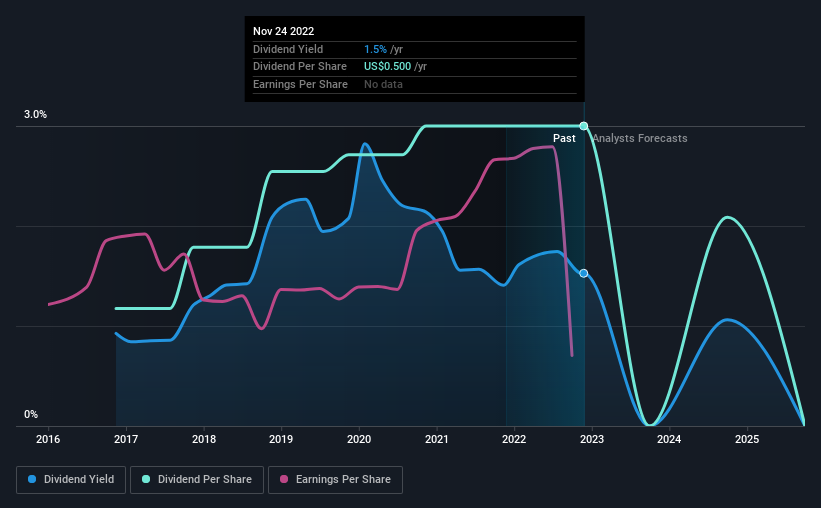
The board of Valvoline Inc. (NYSE:VVV) has announced that it will pay a dividend on the 15th of December, with investors receiving $0.125 per share. This payment means the dividend yield will be 1.5%, which is below the average for the industry.
View our latest analysis for Valvoline
Valvoline Doesn't Earn Enough To Cover Its Payments
It would be nice for the yield to be higher, but we should also check if higher levels of dividend payment would be sustainable. Before this announcement, Valvoline was paying out 82% of earnings, but a comparatively small 57% of free cash flows. In general, cash flows are more important than earnings, so we are comfortable that the dividend will be sustainable going forward, especially with so much cash left over for reinvestment.
If the company can't turn things around, EPS could fall by 15.9% over the next year. If the dividend continues along the path it has been on recently, the payout ratio in 12 months could be 114%, which is definitely a bit high to be sustainable going forward.

Valvoline Doesn't Have A Long Payment History
Even though the company has been paying a consistent dividend for a while, we would like to see a few more years before we feel comfortable relying on it. The dividend has gone from an annual total of $0.196 in 2016 to the most recent total annual payment of $0.50. This works out to be a compound annual growth rate (CAGR) of approximately 17% a year over that time. We're not overly excited about the relatively short history of dividend payments, however the dividend is growing at a nice rate and we might take a closer look.
The Dividend Has Limited Growth Potential
Some investors will be chomping at the bit to buy some of the company's stock based on its dividend history. However, initial appearances might be deceiving. Valvoline's earnings per share has shrunk at 16% a year over the past five years. This steep decline can indicate that the business is going through a tough time, which could constrain its ability to pay a larger dividend each year in the future.
Our Thoughts On Valvoline's Dividend
Overall, we don't think this company makes a great dividend stock, even though the dividend wasn't cut this year. In the past, the payments have been unstable, but over the short term the dividend could be reliable, with the company generating enough cash to cover it. We would probably look elsewhere for an income investment.
Investors generally tend to favour companies with a consistent, stable dividend policy as opposed to those operating an irregular one. However, there are other things to consider for investors when analysing stock performance. Case in point: We've spotted 4 warning signs for Valvoline (of which 1 is potentially serious!) you should know about. Looking for more high-yielding dividend ideas? Try our collection of strong dividend payers.
New: Manage All Your Stock Portfolios in One Place
We've created the ultimate portfolio companion for stock investors, and it's free.
• Connect an unlimited number of Portfolios and see your total in one currency
• Be alerted to new Warning Signs or Risks via email or mobile
• Track the Fair Value of your stocks
Have feedback on this article? Concerned about the content? Get in touch with us directly. Alternatively, email editorial-team (at) simplywallst.com.
This article by Simply Wall St is general in nature. We provide commentary based on historical data and analyst forecasts only using an unbiased methodology and our articles are not intended to be financial advice. It does not constitute a recommendation to buy or sell any stock, and does not take account of your objectives, or your financial situation. We aim to bring you long-term focused analysis driven by fundamental data. Note that our analysis may not factor in the latest price-sensitive company announcements or qualitative material. Simply Wall St has no position in any stocks mentioned.
About NYSE:VVV
Valvoline
Engages in the operation and franchising of vehicle service centers and retail stores in the United States and Canada.
Proven track record with mediocre balance sheet.
Similar Companies
Market Insights
Community Narratives




